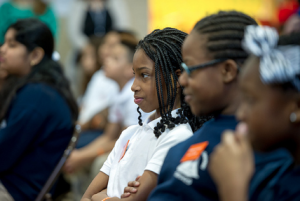 Photo by Maryland GovPics at Flickr Creative CommonsDisparities in out-of-school suspension and expulsion by race, gender and sexual orientation are a critical issue in our schools.
Photo by Maryland GovPics at Flickr Creative CommonsDisparities in out-of-school suspension and expulsion by race, gender and sexual orientation are a critical issue in our schools.
The Discipline Disparities Research to Practice Collaborative, a panel of 26 national experts — researchers, educators, advocates and policy analysts — presented to Congress on March 13 the most comprehensive compilation and analysis of research on exclusionary discipline ever attempted. Read the papers.
Summary findings and recommendations:
- African-American, Hispanic/Latino students, students with disabilities, English Language Learners and LGBTQ students are being suspended at hugely disproportionate rates for the same behavior as non-minority students.
- Schools with low suspension rates have higher test scores compared to similar schools with high suspension rates.
- Suspension differences are caused by differences in school policy and leadership, and not necessarily by student behavior.
- School-wide programs based on building trusting relationships between teachers and students dramatically reduce the need for punishment.
- When problems do occur, practices such as restorative justice are an effective alternative to punishment.
The Collaborative’s findings and recommendations support the Jan. 8, 2014, U.S. Departments of Justice and Education-issued federal guidelines on school discipline policies and practices, which propose best practices, including restorative practices, to improve school climate.
The Disparities Collaborative federal policy briefing, in cooperation with the Congressional Black Caucus Education and Labor Task Force and Senator Christopher Murphy, was Thursday, March 13, 10 a.m., in Rayburn 2103.
The Disparities Collaborative website contains papers on implicit bias, research showing that African American disproportionality cannot be accounted for by differences in student behavior, a myths and facts sheet on disciplinary disproportionality, links to other reports and a Resource Directory of organizations nationwide working on these issues.
International Institute for Restorative Practices faculty consulted with the Collaborative, which was sponsored by the Atlantic Philanthropies and Open Society Foundations and led by the Equity Project at Indiana University and UCLA’s Center for Civil Rights Remedies at the Civil Rights Project.
Coverage of this release in the U.S. press includes:
